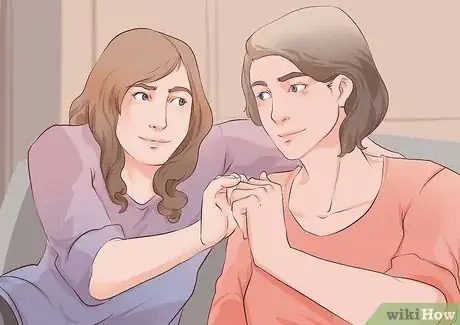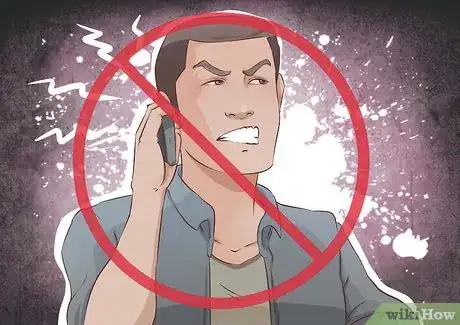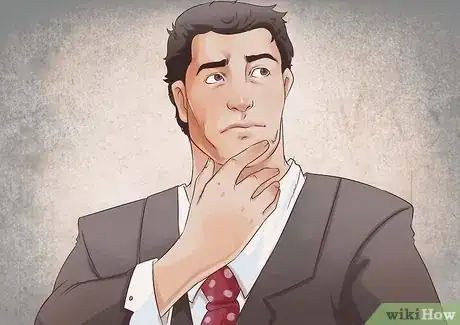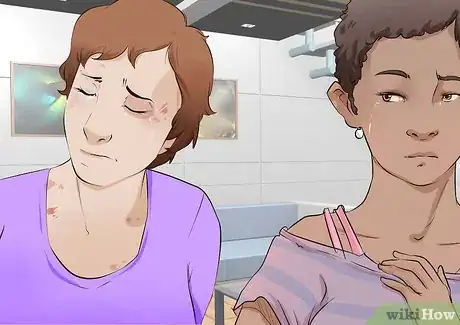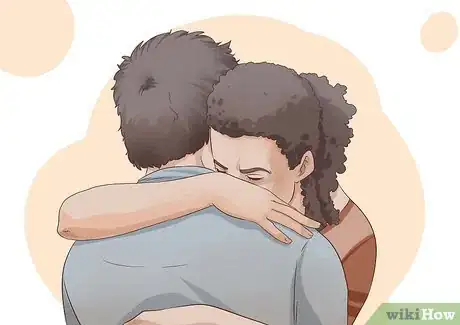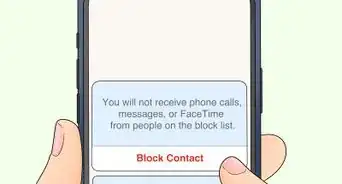This article was co-authored by Chloe Carmichael, PhD. Chloe Carmichael, PhD is a Licensed Clinical Psychologist who runs a private practice in New York City. With over a decade of psychological consulting experience, Dr. Chloe specializes in relationship issues, stress management, self esteem, and career coaching. She has also instructed undergraduate courses at Long Island University and has served as adjunct faculty at the City University of New York. Dr. Chloe completed her PhD in Clinical Psychology at Long Island University in Brooklyn, New York and her clinical training at Lenox Hill Hospital and Kings County Hospital. She is accredited by the American Psychological Association and is the author of “Nervous Energy: Harness the Power of Your Anxiety” and “Dr. Chloe's 10 Commandments of Dating.”
There are 11 references cited in this article, which can be found at the bottom of the page.
wikiHow marks an article as reader-approved once it receives enough positive feedback. This article received 11 testimonials and 82% of readers who voted found it helpful, earning it our reader-approved status.
This article has been viewed 450,481 times.
One of the downsides of friendships is the potential for a friend to backstab or betray you. When a friend turns against you, it may feel like the end of the world, especially if this person is who you would normally turn to during times of need. Coping with friends who turn against you requires compassionate attention to your own emotions as well as closely considering the status of the current relationship and moving forward accordingly. Learn how to care for your hurt feelings and handle a disloyal friend, too.
Steps
Dealing with Hurt Feelings
-
1Acknowledge the pain of disloyalty. It hurts to have someone turn against you or to find out someone you thought was a close friend may not really be who you thought. It's normal to be upset and there is no need to hide the fact that you are hurt.
- Acknowledge the pain by stating it aloud. Name the emotion that you are feeling and own your reaction to it. "I am disappointed because I placed my trust in someone who backstabbed me."[1]
- While you can acknowledge the feelings, remember you are the only one who controls how you react to this disloyalty. In some cases, this person may be treating you a certain way with the hope that you will react in a big way. It is far better to take a step back and reflect on how you are feeling, instead of acting out in the moment.
-
2Take time to reflect. Just as some romantic relationships benefit from a break, friendships can also benefit from time apart. Take this break to think about any major choices like confronting the friends or completely ending the friendships. You may find that you calm down after a few days, or you may find that during the break you actually feel better without the friends.
- You can also use this time to consider opening yourself to making some new friends who are more supportive. Spend time with a few other acquaintances, classmates, or coworkers. Do you notice yourself liking being with these people over your other friends? Do you notice good qualities in these people that your other friends lack?
- Another way to engage in reflection is to journal. Writing down the experience and your thoughts and feelings associated with it can be incredibly freeing and empowering.[2] You can even brainstorm ideas as to how you want to deal with the aftermath of a friend's betrayal.
Advertisement -
3Practice regular self-care. Before you can even think about rebuilding trust with your friends, you have to first take care of you. We often put our own feelings on the back burner to avoid feeling bad ourselves or to avoid making others feel bad about their actions against us. Denying yourself time to care for your own needs does not lend itself to creating long-term, healthy friendships.[3]
- Forgive yourself for taking a chance on the friendship and to have whatever feelings you had in the moment after you found out about the betrayal. When someone steals from you or goes behind your back to do something it is easy to beat yourself up over letting anyone have the chance to use you.
- Treat yourself kindly during this time. Do things you like to do—whether that is binge-watching your favorite TV series, getting a manicure, or spending time with family.[4]
-
4Be the bigger person. Don’t entertain urges to get revenge or hold grudges. Try to forgive those that do you wrong, if only so you don’t have to carry the burden of anger. You may feel like you are letting the other person off too easy if you let go of the anger and move on. This is not the case. Holding onto the anger hurts you first and foremost. In many cases, the person you are angry with has already moved on. You take back your power by being the bigger person and not reacting in a vengeful way.[5]
- Keep in mind that you can't control what other people do or say about you. Getting angry and nasty will not make you have any more control than you have now. And in the end, if your actions are not in line with your character or beliefs, you will likely feel ashamed or guilty for have acted outside your values.
- For example, if a friend or classmate is spreading rumors about you, you can choose to not make the situation uglier by doing the same. Step back and come up with a less vindictive manner to handle the situation instead.
- The old saying “fight fire with fire” really makes little sense in reality. You normally fight fire with water or something else that puts out the fire, right? Don't fuel the fire with attention or your own negative actions because all that happens then is a much bigger fire.
-
5Hang out with fun and supportive friends and family.[6] It can be extremely comforting after betrayal to surround yourself with positive people who want nothing but the best for you. This not only helps you process and cope with a betrayal, but it also reaffirms your value as a person and a friend.[7]
- For example, if one friend let you down, be sure to cherish your other friends who have consistently been loyal to you. Let these people know how much you appreciate them.
Evaluating Your Relationship
-
1Evaluate your friendship. When a friend who knows you well turns against you, it may affect your personal, social, or career standing. Depending on how much of an impact the rumor or betrayal may have had, you must decide if it’s better to ignore it or address the issue. [8]
- If the problem is simply with the one friend involving a minor issue, it's probably pretty safe to just ignore the friend. On the other hand, if your job is at risk or there are allegations that go beyond a small rumor that will blow over, you may need to take other steps to prevent the situation from getting worse.
- Is everyone talking about the issue? Are there legal ramifications? How many people are aware of what happened? Asking these questions can help you discover the scope of the problem.
- It may be helpful to talk with an unbiased party about what you can do to resolve this issue. In the end, you must trust your own judgment about how to handle it, but getting some sound advice could be beneficial.
-
2Combat negative effects. If the friend who turned against you spread rumors or bad-mouthed you to others, try to do what you can to counteract those negative perceptions of you.[9]
- You can try defending yourself or approaching certain people and trying to explain your side of the story with something like "Those rumors are not true..." Be aware, though, that there is always a chance people won’t want to listen.
- Actions speak louder than words and may help you to repair your reputation much faster. Instead of wasting time trying to talk your way out of a rumor, use positive actions to show those around you the rumors are simply not true. If people called you a cheater, try to be transparent about your everyday operations to shut down the rumors.
-
3Decide whether or not to confront the person. There are going to be times when you need to say something and there are going to be times where you can just let whatever happened go. Use your judgment of your friend and the situation to determine if a response is necessary.[10]
- Think about the positive and negative consequences of confronting someone who hurt you. If you just drop the person as a friend, you will never have a chance to hear his side of the story and potentially clear up what may be a simple misunderstanding. You will also have the opportunity to express how you feel. On the other hand, the person may become verbally abusive or combative, leading to more hurt feelings.
- If whatever happened between you and your friend seems out of character for him, this might be a time to practice some compassion and just let things go. This will be even truer if you know the friend is going through something and may have turned against you out of desperation.
- If you do decide to address the issue, say something like “I heard you told our boss I cheated on the project. I’m really hurt by these accusations. I did my part fair and square. I'd like to know why you said those things.”
-
4Determine if you want to repair the friendship. This process is usually tied to balancing how much value you place in the relationship and what actually occurred. You may need to take a close look at this friendship and see if it’s worth fighting for. If the friend is not someone you consider to be close, it might be less stressful to walk away. If, on the other hand, this is a friendship you value, find a way to address the issue in a constructive yet firm way.[11]
- Even if this is a friendship you really value, there may be actions so unforgivable that the friendship will not recover. Before you take matters into your own hands, you must be absolutely sure the friend is responsible. Gather evidence that supports your findings before deciding to end the friendship. For example, if there is talk that your best friend is involved with your significant other, you would want to be almost 100% sure before making an accusation.
-
5Mend the friendship if you want. Make recommendations for how the person can prove her loyalty again. Take a step back and look at what caused your friend to turn on you. Was a friend at work feeling jealous of your accomplishments so she lied about the credit for your work? Take this as a compliment and create an opportunity for the friend to come clean and acknowledge your work.[12] [13]
- Let your friend know that you do not take forgiveness lightly. Say something like "I forgive you and want to move on from this situation. But, I want you to know that you really hurt me and I may not be able to continue the friendship if this happens again."
- Set clear boundaries with your friend so he or she understands why you are putting whatever happened behind you. She should know that going forward you expect total loyalty so there is no opportunity to let it happen again. For example, if this was a work project, going forward use a new system of dividing up the work so each team member clearly has his or her own “part”. If the issue came up at home, change the level of access this friend has to your home so there isn't a way for this to happen again.
Looking at the Big Picture
-
1Focus on your own behavior. Strive to be a better friend so you attract more loyal friends. Look at the healthy friendships you have mutually enjoyed and learn from those. Learn to be a better you by not allowing yourself to get caught up in drama at work or at home. Let go of unhealthy relationships.[14]
- Do not get caught up in a toxic circle of doing negative things because others do them. You will not find friends that are trustworthy if they cannot trust you. When you say you’ll do something, do it. If you make plans with others, follow through with them. Doing small deeds can go a long way to helping you build trustworthiness.
-
2Consider the type of friends you tend to make. The only thing you have absolute control over is you. You get to decide how you react to certain people and who gets space in your life. You do not have to remain friends or even friendly with someone just because you were friends since you were kids or you happen to work in the same office.[15]
- If you find work friends are harder to trust because of competition at work, make clear boundaries about not bringing work home. You do not have to be friends or social with co-workers if it is only leading to problems at work.
- The same goes for friendships you make in other settings. Are these people positive influences? Are they using you? Look at the types of friends you have and the kind of friendship obstacles you encounter. Maybe it’s a good idea to reevaluate all your friendships to see if you are making smart, healthy choices in your relationships.
-
3Don’t compromise your personal values for friendships. This includes hiding things about yourself or family just to keep certain friends. You may find friends act differently in certain contexts and that you cannot always depend on certain friends to be consistent. If you lose a friendship because you need to focus on family, then it wasn't a healthy relationship to begin with.[16]
- This also includes ignoring the actions of a friend in the name of friendship. You have the right to stand up for your beliefs. In addition, you should not be pressured to look the other way if a friend does something you feel is wrong or violates the law.
References
- ↑ Chloe Carmichael, PhD. Licensed Clinical Psychologist. Expert Interview. 29 May 2019.
- ↑ http://psychcentral.com/lib/the-health-benefits-of-journaling/
- ↑ http://greatergood.berkeley.edu/raising_happiness/post/how_to_deal_with_mean_people
- ↑ Chloe Carmichael, PhD. Licensed Clinical Psychologist. Expert Interview. 29 May 2019.
- ↑ http://personalexcellence.co/blog/backstab/
- ↑ Chloe Carmichael, PhD. Licensed Clinical Psychologist. Expert Interview. 29 May 2019.
- ↑ http://www.success.com/article/why-you-need-positive-people-in-your-life
- ↑ http://www.pamf.org/teen/abc/assessing/evaluating_friendship.html
- ↑ http://personalexcellence.co/blog/backstab/
- ↑ http://tinybuddha.com/blog/4-simple-tips-for-confronting-someone-who-hurt-you/
- ↑ http://personalexcellence.co/blog/friend-betrayal/
- ↑ http://greatergood.berkeley.edu/raising_happiness/post/how_to_deal_with_mean_people
- ↑ http://personalexcellence.co/blog/take-credit/
- ↑ http://www.oocities.org/rainforest/1038/friends.htm
- ↑ http://greatergood.berkeley.edu/raising_happiness/post/how_to_deal_with_mean_people
- ↑ http://psychcentral.com/lib/why-friends-disappear-when-crisis-turns-chronic/
About This Article
If you’re struggling to cope with friends who have turned against you, try to find healthy ways to express your feelings and decide how you want to respond. Accept that you have a right to feel annoyed or hurt about what happened, since you’ll only be able to move on once you’ve processed your feelings. For example, you might say to yourself aloud, “I feel disappointed because I placed my trust in someone who stabbed me in the back.” Then, try to let go of the anger and move on, since trying to get revenge will only make the conflict more bitter. Find supportive friends or family members to hang out with so you can still have fun and take your mind off the betrayal. Additionally, put time and effort into the healthy friendships you have, which will help you find friends who are truly trustworthy. For tips from our Relationship co-author on how to decide if mending your friendship is worthwhile, keep reading!





